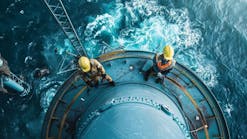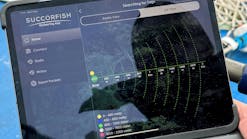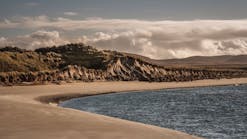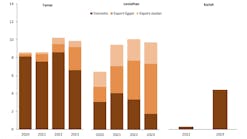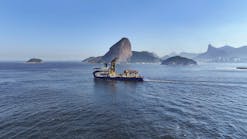Danish oil company Dong emerged as the surprise suitor for BP’s 10.34% stake in the Ormen Lange gas-condensate project. The two entered into an agreement late last year, which was due to come into effect Jan. 1, subject to approval from the Norwegian authorities. At $1.2 billion, it represents Dong’s largest single upstream investment to date.
Dong’s participation would strengthen Scandinavia’s grip on the project to around 75%, the outsiders being ExxonMobil and Norske Shell. However, the latter will take over the reins once production starts in late-2007 from development operator Norsk Hydro. The major stakeholder is the Norwegian state-owned Petoro, with 36.47%. Statoil holds the balance.
Ormen Lange’s estimated 380 bcm of gas will head mainly to Bacton, England, via the soon-to-be-installed trans-North Sea Langeled pipeline, with the remainder transiting at the Sleipner complex before passing through Norway’s established trunkline system to mainland Europe. Dong puts its share of the reserves at 40 bcm. In recent years, it has expanded its gas marketing operations to neighboring countries, but this is its first major venture involving non-Danish supplies.
Map shows route of Ormen Lange pipeline, in which Dong is bidding to become a stakeholder.
Hydro has ushered in two further projects relating to its mainstay fields in Norway. In the Norwegian Sea, Njord, an oil producer since 1997, is to be re-configured for commercial gas production. Under a planned NKr1.6-billion re-development, gas-drying equipment will be added to the topsides of the semisubmersible platform, with a gas export line installed, tying into the nearby Åasgard Transport trunkline system. Hydro also aims to raise oil recovery from the field by drilling new producer wells employing narrow hole drilling through production tubing.
In the North Sea, Hydro has contracted Aker Offshore Partner to supply and install new production water re-injection equipment on the Oseberg Field Center. The new kit should be in place by the end of the year, and will be hooked up to an injection well on Oseberg B. Hydro’s declared long-term aim is to eliminate all discharges from its Norwegian sector installations.
Bids close for Faeroes round
Eight oil companies have submitted bids for offshore exploration acreage under the Faroe Islands’ second licensing round. The area offered covers over 19,000 sq km and comprises 83 whole and 39 part-blocks. Most of these lie east or southeast of the islands. Awards will be issued as soon as possible, according to the Faroese Petroleum Administration.
Bidders already holding interests from the first round were Atlantic Petroleum, Dong, Faroe Petroleum, Shell, and Statoil. Newcomers were Geysir Petroleum, ChevronTexaco, and OMV. Following the disappointment of the first round well results - only one discovery, and of dubious commercial value - the Faroese authorities were not expecting a deluge of applications. ChevronTexaco’s candidature was predicted, however, in light of their rumored Lochnagar oil discovery last year east of the median line with the UK. OMV’s application fitted its strategy of building up E&P interests west of the Shetlands.
Norway’s latest “Pre-defined Areas” licensing round also closed in the fall, with 22 companies putting in bids. Most blocks on offer were in “mature” areas around established North Sea production centers. Awards were expected to be issued last month.
Gazprom sets supply target
Gazprom, the world’s largest producer of natural gas, plans to step up its assault on the UK sector, which will become increasingly dependent on gas imports as UK North Sea production declines. The Russian company has been active in Britain for the past five years as a market trader and as a partner of the Interconnector pipeline taking North Sea gas from Bacton, England, to Zeebrugge, Belgium. Now it wants to bring its own gas from Russia directly to the UK market. The target is to supply 13 bcm/yr, or 10% of the country’s commercial and industrial needs, by 2010.
The company needs to act quickly, with other consortia already establishing alternative supply sources such as the Langeled and (Dutch) BBL trans-North Sea trunklines, and new LNG import terminals east of London and in west Wales. At a recent briefing in Londonto promote the company’s re-named UKsubsidiary, Alexander Medvedev, general director of Gazexport, said that a decision was imminent concerning a new project that would bring Russian gas to northern Europe via a new North Sea pipeline system. The offshore section could either terminate in northern Germany, or a branch could be added out to Bacton. Vitaly Vasiliev, CEO of Gazprom Marketing & Trading, said the company was also considering investing in new offshore storage facilities close to the UK to cater for swing demand.
Taking the pressure off duty-holders
In November, Britain’s North Sea industry had something to celebrate: the 40th anniversary of the UK Continental Shelf Act. This piece of legislation triggered the first wave of activity in the sector. Whether there will be anything left to savor in 2044 remains to be seen. One mid-life optimist is Aberdeen-based Energy Development Partners, one of the incoming wave of North Sea specialist independents, which claims to have formulated a new type of business model.
In recent times, the company points out, numerous potentially viable UKCS projects have gathered dust in the majors or supermajors’ portfolios while their funds were committed to larger returns elsewhere. The only solution seemed to be a quick sale of the field, without realizing its true worth. But EDP has an alternative approach. This involves EDP conducting a detailed development review of the asset on the owner(s’) behalf to identify investment potential that fit its (EDP’s) in-house screening criteria. A production-sharing agreement is then formulated that defines the commercial terms including investment scope, future value, exit strategy, and return distribution. Finally, EDP takes on full responsibility for project development planning and execution, at the same time working closely with the license duty holder.
By participating in all aspects of the development, from investment to production, the company says it can remove the commercial risk from the owner, and provide manpower and resources.


